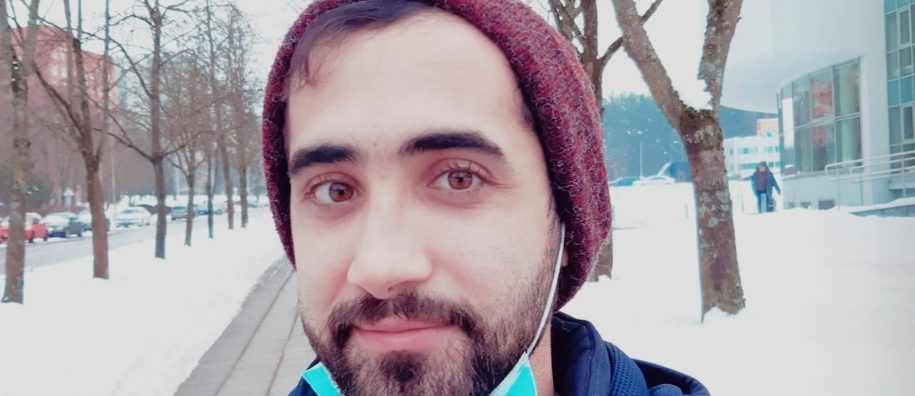
Iranian Sina Dehghani is adjusting to life in Lithuania – the weather, traditions and culture. In January, it was the first time the 27-year-old student celebrated New Year’s Day in western Europe - in Vilnius. In Iran, the New Year is celebrated on March 20th, and called Nowruz, according to the Persian calendar. Now it is the year 1399 and in March we will celebrate the start of the year 1400, explained Dehghani.
Why did you come to Vilnius, Lithuania?
- I wanted to pursue a Master’s Degree studies in a Social Work programme in Europe. I was looking for universities on the internet and found the Mykolas Romeris University (MRU) “Social Work with Children and Youth” Master’s Degree programme. I applied, I was interviewed online by MRU representatives and then in August I was accepted. In September I came to Vilnius and began studies. But, I had to spend 14 days in self-isolation and could not go out of the dorm.
What did you know about Lithuania before coming?
- I had information that it was a Baltic country. I know that Lithuania got independence from the Soviet Union and is developing very fast.
And your first impressions when you come?
- This is my first time visiting Europe, but it was not shocking for me. I prepared myself for studies in Lithuania by reading about the country and traditions on the Internet. I prepared myself for seeing changes. I talked to friends who had been in Europe. I was told to expect people that are “cold” and not very temperamental. Now, I see that Lithuania has a unique calmness. Yes, it is a really good country for students and studies. There is no hustle and bustle here like in Tehran, so I can fully concentrate on my studies.
Did you spend some time in Turkey before coming to Lithuania?
- Yes, I was in Ankara for a month to get a visa from the Lithuanian Embassy there. Then I came here to Vilnius to start studies at Mykolas Romeris University.
In Iran, Nowruz, the Persian New Year, is celebrated in March. Any special traditions?
- We celebrate with fireworks at night, which can be seen all throughout the city – everywhere. On New Year’s Day, we visit family and grandparents. Our grandparents usually give us presents – often money. The poems of Persian poet Ferdowsi are recited from the “Book of Kings” Shahnameh. We light candles. Also, there are traditional objects that celebrate the start of the New Year and these items are displayed in homes during this time including:
- Sabzeh: Grass or sprouts that will grow leading up to the holiday symbolizing rebirth, renewal
- Senjed: Dried fruit, ideally a sweet fruit from a lotus tree, for love
- Sib: Apples, for beauty and health
- Seer: Garlic, for medicine and taking care of oneself
- Samanu: A sweet pudding, for wealth and fertility
- Serkeh: Vinegar, for the patience and wisdom that comes with aging
- Sumac: A Persian spice made from crushed sour red berries, for the sunrise of a new day
- New Year’s Day in Iran is a holiday just like elsewhere throughout the world? But you celebrate for a longer period?
- Yes, of course, it is a holiday. But, we have a long,13-day holiday beginning from mid-March to celebrate the New Year. There are few people that work during this time except those employees that work at banks. People go outside – to parks and spend time outside.
How does life in Lithuania differ from life in Iran? What are the differences that you noticed?
- Culturally, there are so many changes. In Iran people for me seems very active and open. When you are among Iranian people, you don’t feel loneliness. It’s the nature of European countries to be more rational and reserved, but I am trying to adapt myself. As for studies, the level of education here in Lithuania is very high – especially the professors. I was surprised at MRU for the quality of subjects, the methods of teaching are conducive to learning.
What about the food? Have you tried any Lithuanian traditional cuisine?
- No, I have not yet tried Lithuanian foods, but I am looking forward to do that. Because of the pandemic and restrictions, it is not possible to go out to eat now. I don’t have a problem with food here and eat all types of foods. I am ready to try new foods, new things.
What are your plans after graduation from MRU?
- I plan to return to Iran. If I can, I will pursue my PhD in Social Work or Psychology. It is also possible that I may do PhD studies in Europe, if possible. I would like to be a professor -to teach in a university in Iran and I need to have a PhD. This is my goal. Studies at MRU are helping me get a step closer to achieving my goal.